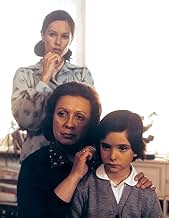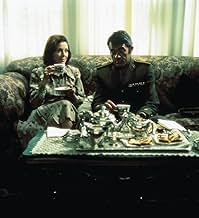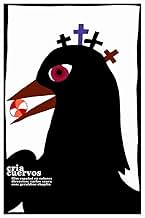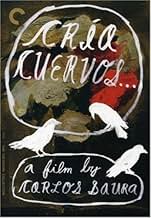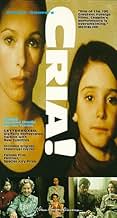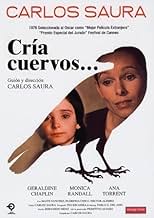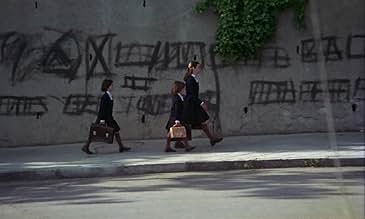IMDb RATING
7.9/10
12K
YOUR RATING
In the twilight of Francisco Franco's dictatorship, an 8-year-old orphan and her two sisters find shelter in the house of their stern aunt and try their best to acclimatize to a new reality.... Read allIn the twilight of Francisco Franco's dictatorship, an 8-year-old orphan and her two sisters find shelter in the house of their stern aunt and try their best to acclimatize to a new reality. Can they summon up the courage to grow up?In the twilight of Francisco Franco's dictatorship, an 8-year-old orphan and her two sisters find shelter in the house of their stern aunt and try their best to acclimatize to a new reality. Can they summon up the courage to grow up?
- Awards
- 8 wins & 4 nominations total
Conchita Pérez
- Irene
- (as Conchi Perez)
Mayte Sanchez
- Maite
- (as Maite Sánchez)
Mónica Randall
- Paulina
- (as Monica Randall)
Josefina Díaz
- Abuela
- (as Josefina Diaz)
Germán Cobos
- Nicolás Garontes
- (as German Cobos)
Héctor Alterio
- Anselmo
- (as Hector Alterio)
Julieta Serrano
- Ana
- (voice)
- Director
- Writer
- All cast & crew
- Production, box office & more at IMDbPro
Featured reviews
10zetes
A perfect sister film to one of my absolute favorites, Spirit of the Beehive. It also stars Ana Torrent and has similar themes. And I like it probably as much. Torrent, three years older but looking pretty much the same, plays the middle child of three girls. At the beginning of the film, their father has just died. Their mother (played by Geraldine Chaplin) died a while back. The film is told through the mind of Ana, who is still mourning her mother, and she often sees her. It can be confusing at the beginning. Chaplin also appears as the adult Ana, who narrates some of her thoughts, or possibly as what Ana believes she will become. This is very ambiguous. The girls' aunt Paulina is now taking care of them. The duty was kind of forced upon her and, while she's trying her hardest, it's taking its toll. She's stern and not well liked by the girls, especially Ana. There isn't much plot, per se, and what little there is shouldn't be ruined. We often see Ana's imagination and memories come to life. We see her witness fights between her parents. Later on, she reenacts them with her sisters. The film is about what children observe, how they interpret it and how they act on those interpretations. The film also has political ramifications, subtle ones that are pretty difficult to grasp. The title is the beginning of a Spanish proverb that goes: "Raise ravens, and they'll tear out your eyes." Like Spirit of the Beehive, the film depicts a child experimenting with her own cruelty and violence. Supposedly this is all a criticism of the Fascist government (Franco had just died by this point, so his regime was just on its way out). It's a very dense and fascinating movie. You'd probably still be swimming through its mysteries on a hundredth viewing. If you thought possibly that Ana Torrent was not acting in Spirit of the Beehive, this will set you straight. Her blank, soulful expression is here in full force, of course, but here you see the slightest smile creep across her face, and you can just tell exactly what she's thinking. I'm afraid I've done an awful job reviewing Cría Cuervos. I haven't expressed how touching it is when dealing with Ana's loneliness (there's a scene where she dreams that her mother pops into her bedroom to tell her a story that's just heartbreaking), or how it often straddles dark comedy, like the scenes between Ana and the maid. I think that difficulty in reviewing it shows just how layered and confounding the film is. It shoots right up my favorites list. It's easily the best film I've seen all year. Bravo to Criterion for bringing this one to DVD. Hope they also get to Saura's La Caza sometime in the future.
Told through the perspective of a young child - and her older self - and interweaving past, present and future, but also includes imagined and surreal scenes, albeit staged so masterfully that it all remains stringent and comprehensible and the political implications are apparent; again, Geraldine Chaplin convinces in a double role (as the mother and as the adult child.)
I have seen several thousand films in my life and this one became the top one almost instantly. Ever since I have watched it several times and it has never failed to impress and delight me - it even increases the sense of mystery undelying in its baroque and compelling history. On my opinion, it is Carlos Saura's masterpiece and perhaps the best film ever made about the mysterious inner world children live in and create. There is so much to be enjoyed in this film, that a conventional review will not make it justice.
I took this film in a video library and watched it 3 times. It is one of the most powerful films I have ever seen. The techniques in the film are very modest but it's amazing what the director does with them. I liked very much this sad and quiet girl. The scene where her pet dies and she buries him is so solemn and heart-breaking. I felt sad about the old Grandmother who watches the old pictures in sadness. I also liked Geraldine Chaplin, she is very good in this role, her intimate bond with the daughter, and how she looks at Ana with sadness when the girl doesn't notice it. The scene where the girl imagines her mom combing her hair is mesmerizing. Maria's pain is very palpable.
By the way I found some interesting information about this film. Geraldine Chaplin was dubbed in the episodes where she plays the grown Ana. It was done because the actress has a slight British accent which is not annoying or too prominent (for me at least), but the point is that she plays a grown girl, and it would be rather weird if a grown person acquires an accent in one's mother tongue if this accent did not exist during the childhood. So it was an intelligent consideration of the director.
I recommend this movie very much.
By the way I found some interesting information about this film. Geraldine Chaplin was dubbed in the episodes where she plays the grown Ana. It was done because the actress has a slight British accent which is not annoying or too prominent (for me at least), but the point is that she plays a grown girl, and it would be rather weird if a grown person acquires an accent in one's mother tongue if this accent did not exist during the childhood. So it was an intelligent consideration of the director.
I recommend this movie very much.
This film is such a splendid experience that it's difficult to really describe objectively why. The plot, the characters are revealed at a perfect tempo, keeping the audience engrossed and anticipating what's next. Any film with such sparse dialogue needs to make the rare lines worthwhile, and Saura certainly does, probably learning from Erice, the master of indispensable dialogue. Ana Torrent invites all sorts of Erice comparisons, but I see Saura taking a step beyond him here visually.
"Beehive" was a landmark film, and unlike anything that had been made. But the camera maintained the same distance and the story was fundamentally allegorical. Saura experiments with distance, sometimes following the characters closely, sometimes giving an omniscient birds eye view of the area. Sometimes remaining a mere witness to what's happening. It's very carefully calculated to best enhance the scene and keep these extraordinary events within the realm of possibility.
If there's such a film as a director's film, this is it. Although it is certainly worthwhile for the performances as well.
5 out of 5 - Essential
"Beehive" was a landmark film, and unlike anything that had been made. But the camera maintained the same distance and the story was fundamentally allegorical. Saura experiments with distance, sometimes following the characters closely, sometimes giving an omniscient birds eye view of the area. Sometimes remaining a mere witness to what's happening. It's very carefully calculated to best enhance the scene and keep these extraordinary events within the realm of possibility.
If there's such a film as a director's film, this is it. Although it is certainly worthwhile for the performances as well.
5 out of 5 - Essential
Did you know
- TriviaThe title in Spanish stems from the phrase "Raise ravens and they'll pluck out your eyes." The equivalent phrase in English would be "you reap what you sow."
- Crazy creditsThe closing credits identify Cancion y Danzas Number 5 of Frederic Mompou. But it was definitely Number 6 that we heard.
- ConnectionsFeatured in Zomergasten: Episode #4.1 (1991)
- SoundtracksCanción y Danzas N.6
Composed by Frederic Mompou (as Federico Mompou)
- How long is Cría Cuervos?Powered by Alexa
Details
- Release date
- Country of origin
- Official site
- Language
- Also known as
- Cría cuervos
- Filming locations
- 15 Calle de María de Molina, Madrid, Spain(family house)
- Production companies
- See more company credits at IMDbPro
Box office
- Gross worldwide
- $14,548
- Runtime1 hour 45 minutes
- Sound mix
- Aspect ratio
- 1.66 : 1
Contribute to this page
Suggest an edit or add missing content

